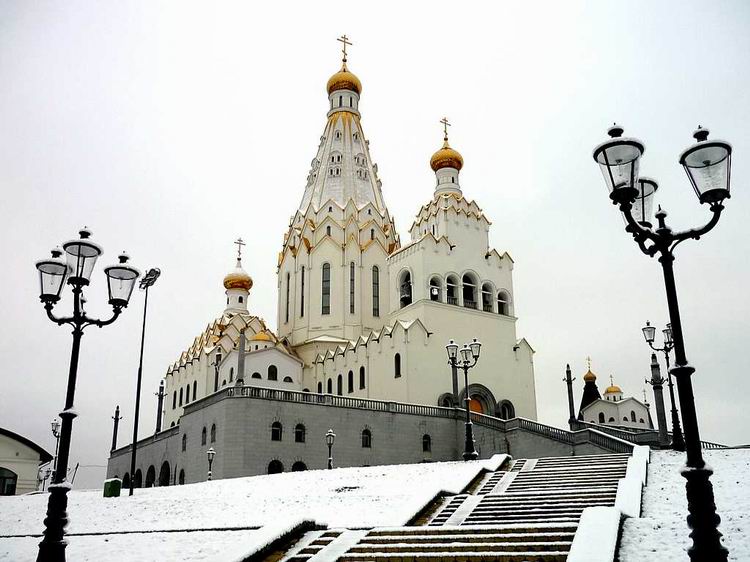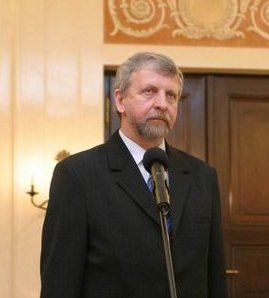|
Conservative Christian Party – BPF
The Conservative Christian Party of the Belarusian People's Front ( be, Кансэрватыўна-Хрысьціянская Партыя - БНФ, Kanservatyŭna-Chryścijanskaja Partyja BNF; russian: Консервативно-христианская партия — БНФ) is a political party in Belarus that opposes the government of president Alexander Lukashenko. It was de facto formed after the split of the Belarusian People's Front in 1999. The October 2004 legislative elections were boycotted by the party, led by Zianon Pazniak. These elections fell according to the OSCE/ODIHR Election Observation Mission significantly short of OSCE commitments. Universal principles and constitutionally guaranteed rights of expression, association and assembly were seriously challenged, calling into question the Belarusian authorities' willingness to respect the concept of political competition on a basis of equal treatment. Principles of an inclusive democratic process—whereby ... [...More Info...] [...Related Items...] OR: [Wikipedia] [Google] [Baidu] |
Zianon Pazniak
Zianon Stanislavavič Pazniak ( be, Зянон Станіслававіч Пазняк, born 24 April 1944) is a Belarusian nationalism, Belarusian nationalist politician, one of the founders of the Belarusian Popular Front and leader of the Conservative Christian Party – BPF. He was the Belarusian Popular Front nominee for President of Belarus in the 1994 Belarusian presidential election, 1994 election. Zianon Pazniak has lived in the United States since 1996. Biography Zianon Pazniak was born in the village of Subotniki in Baranavichy Voblast (present-day Grodno Region, Hrodna Region). He graduated from the Belarusian State Academy of Arts, Belarusian State Institute of Theatre and Arts in 1967 and completed his postgraduate studies at the Institute of Ethnography, Art and Folklore in 1972. Upon completion of his university studies, Pazniak worked as an arts researcher. After a wave of Soviet political-administrative repressions in 1974 resulting in the loss of his work ... [...More Info...] [...Related Items...] OR: [Wikipedia] [Google] [Baidu] |
Alexander Lukashenko
Alexander Grigoryevich Lukashenko (as transliterated from Russian language, Russian; also transliterated from Belarusian language, Belarusian as Alyaksand(a)r Ryhoravich Lukashenka;, ; rus, Александр Григорьевич Лукашенко, Aleksandr Grigoryevich Lukashenko, ɐlʲɪkˈsandr ɡrʲɪˈɡorʲjɪvʲɪtɕ lʊkɐˈʂɛnkə. In English language, English, both transliterations are used, and his first name is often anglicized to ''Alexander''. born 30 August 1954) is a Belarusian politician who has been the first and only president of Belarus since the establishment of the office on 20 July 1994, making him the List of current state leaders by date of assumption of office, longest-sitting European president. Before his political career, Lukashenko worked as director of a state farm (''sovkhoz''), and served in the Soviet Border Troops and in the Soviet Army. Lukashenko continued state ownership of key industries in Belarus after the dissolution of the Sov ... [...More Info...] [...Related Items...] OR: [Wikipedia] [Google] [Baidu] |
Right-wing Politics In Belarus
Right-wing politics describes the range of political ideologies that view certain social orders and hierarchies as inevitable, natural, normal, or desirable, typically supporting this position on the basis of natural law, economics, authority, property or tradition.T. Alexander Smith, Raymond Tatalovich. ''Cultures at war: moral conflicts in western democracies''. Toronto, Canada: Broadview Press, Ltd, 2003. p. 30. "That viewpoint is held by contemporary sociologists, for whom 'right-wing movements' are conceptualized as 'social movements whose stated goals are to maintain structures of order, status, honor, or traditional social differences or values' as compared to left-wing movements which seek 'greater equality or political participation.' In other words, the sociological perspective sees preservationist politics as a right-wing attempt to defend privilege within the ''social hierarchy''."''Left and right: the significance of a political distinction'', Norberto Bobb ... [...More Info...] [...Related Items...] OR: [Wikipedia] [Google] [Baidu] |
Right-wing Parties In Europe
Right-wing politics describes the range of political ideologies that view certain social orders and hierarchies as inevitable, natural, normal, or desirable, typically supporting this position on the basis of natural law, economics, authority, property or tradition.T. Alexander Smith, Raymond Tatalovich. ''Cultures at war: moral conflicts in western democracies''. Toronto, Canada: Broadview Press, Ltd, 2003. p. 30. "That viewpoint is held by contemporary sociologists, for whom 'right-wing movements' are conceptualized as 'social movements whose stated goals are to maintain structures of order, status, honor, or traditional social differences or values' as compared to left-wing movements which seek 'greater equality or political participation.' In other words, the sociological perspective sees preservationist politics as a right-wing attempt to defend privilege within the ''social hierarchy''."''Left and right: the significance of a political distinction'', Norberto Bobbio and ... [...More Info...] [...Related Items...] OR: [Wikipedia] [Google] [Baidu] |
Political Parties In Belarus
This article lists political parties in Belarus. Parties represented in the National Assembly of Belarus The president Alexander Lukashenko is independent, and draws most of his support from non-partisan members of parliament. Most non-partisan members of parliament are members of the Belaya Rus organization. Parties represented in the regional parliaments Extra-parliamentary parties Parties loyal to the president The president secures most of his support from non-partisan members of parliament. Oppositional parties Historical parties (1991–present) Soviet parties (1918–1991) CPB Clandestine parties Independence parties (1917–1918) See also * List of political parties by country * Politics of Belarus References External links List of political partiesfrom the Ministry of Justice Political Parties In Belarus - Do They Really Matter? [...More Info...] [...Related Items...] OR: [Wikipedia] [Google] [Baidu] |
Political Parties Established In 1999
Politics (from , ) is the set of activities that are associated with making decisions in groups, or other forms of power relations among individuals, such as the distribution of resources or status. The branch of social science that studies politics and government is referred to as political science. It may be used positively in the context of a "political solution" which is compromising and nonviolent, or descriptively as "the art or science of government", but also often carries a negative connotation.. The concept has been defined in various ways, and different approaches have fundamentally differing views on whether it should be used extensively or limitedly, empirically or normatively, and on whether conflict or co-operation is more essential to it. A variety of methods are deployed in politics, which include promoting one's own political views among people, negotiation with other political subjects, making laws, and exercising internal and external force, including w ... [...More Info...] [...Related Items...] OR: [Wikipedia] [Google] [Baidu] |
Eastern Orthodox Political Parties
Eastern may refer to: Transportation *China Eastern Airlines, a current Chinese airline based in Shanghai * Eastern Air, former name of Zambia Skyways *Eastern Air Lines, a defunct American airline that operated from 1926 to 1991 *Eastern Air Lines (2015), an American airline that began operations in 2015 *Eastern Airlines, LLC, previously Dynamic International Airways, a U.S. airline founded in 2010 *Eastern Airways, an English/British regional airline *Eastern Provincial Airways, a defunct Canadian airline that operated from 1949 to 1986 *Eastern Railway (other), various railroads * Eastern Avenue (other), various roads *Eastern Parkway (other), various parkways *Eastern Freeway, Melbourne, Australia *Eastern Freeway Mumbai, Mumbai, India *, a cargo liner in service 1946-65 Education *Eastern University (other) * Eastern College (other) Other uses * Eastern Broadcasting Limited, former name of Maritime Broadcasting System, Canad ... [...More Info...] [...Related Items...] OR: [Wikipedia] [Google] [Baidu] |
Conservative Parties In Belarus
Conservatism is a cultural, social, and political philosophy that seeks to promote and to preserve traditional institutions, practices, and values. The central tenets of conservatism may vary in relation to the culture and civilization in which it appears. In Western culture, conservatives seek to preserve a range of institutions such as organized religion, parliamentary government, and property rights. Conservatives tend to favor institutions and practices that guarantee stability and evolved gradually. Adherents of conservatism often oppose modernism and seek a return to traditional values, though different groups of conservatives may choose different traditional values to preserve. The first established use of the term in a political context originated in 1818 with François-René de Chateaubriand during the period of Bourbon Restoration that sought to roll back the policies of the French Revolution. Historically associated with right-wing politics, the term h ... [...More Info...] [...Related Items...] OR: [Wikipedia] [Google] [Baidu] |
Christianity In Belarus
Christianity is the main religion in Belarus, with Eastern Orthodoxy being the largest denomination. The legacy of the state atheism of the Soviet era is evident in the fact that a part of the Belarusians (especially in the east part of the country) are not religious. Moreover, other non-traditional and new religions have sprung up in the country after the end of the Soviet Union. According to the estimations for 2011 by the Ministry of the Interior, 73.3% of the Belarusians are Orthodox Christians, 14.8% are irreligious (atheists and agnostics), 9.7% are Catholic Christians (either Roman Catholic and Belarusian Greek Catholic), and 3.5% are members of other religions (mostly pentecostals). History By the end of the 12th century, Europe was generally divided into two large areas: Western Europe with dominance of Catholicism, and Eastern Europe with Orthodox and Byzantine influences. The border between them was roughly marked by the Bug River. This placed the area now known as B ... [...More Info...] [...Related Items...] OR: [Wikipedia] [Google] [Baidu] |
1999 Establishments In Belarus
File:1999 Events Collage.png, From left, clockwise: The funeral procession of King Hussein of Jordan in Amman; the 1999 İzmit earthquake kills over 17,000 people in Turkey; the Columbine High School massacre, one of the first major school shootings in the United States; the Year 2000 problem ("Y2K"), perceived as a major concern in the lead-up to the year 2000; the Millennium Dome opens in London; online music downloading platform Napster is launched, soon a source of online piracy; NASA loses both the Mars Climate Orbiter and the Mars Polar Lander; a destroyed T-55 tank near Prizren during the Kosovo War., 300x300px, thumb rect 0 0 200 200 Death and state funeral of King Hussein rect 200 0 400 200 1999 İzmit earthquake rect 400 0 600 200 Columbine High School massacre rect 0 200 300 400 Kosovo War rect 300 200 600 400 Year 2000 problem rect 0 400 200 600 Mars Climate Orbiter rect 200 400 400 600 Napster rect 400 400 600 600 Millennium Dome 1999 was designated as the Interna ... [...More Info...] [...Related Items...] OR: [Wikipedia] [Google] [Baidu] |
1995 Belarusian Referendum
A four-question referendum was held in Belarus on 14 May 1995, alongside parliamentary elections. The four issues were the possibility of giving the Russian language equal status with Belarusian, whether new national symbols should be adopted, whether there should be economic integration with Russia and changes to the constitution that would allow early elections if Parliament systematically violated the constitution.Nohlen & Stöver, pp255-256 According to official results, all four were approved by at least three-quarters of voters, with a turnout of 64.8%. The OSCE Parliamentary Assembly stated that the referendum violated international standards. Members of the opposition claimed that the organisation of the referendum involved several serious violations of legislation, including the constitution. Background Before becoming president in 1994, Alexander Lukashenko had tried to hold a similar referendum on state symbols in 1993 while still an MP, but had failed to obtain par ... [...More Info...] [...Related Items...] OR: [Wikipedia] [Google] [Baidu] |
Alaksandar Milinkievič
Alaksandar Uladzimyeravič Milinkyevič ( be, Аляксандар Уладзімеравіч Мілінкевіч, translit=Alyaksandar Uladzimyeravich Milinkyevich, russian: Александр Владимирович Милинкевич, translit=Aleksandr Vladimirovich Milinkievich, born 25 July 1947 in Grodno) is a Belarusian politician. He was nominated by the leading opposition parties in Belarus to run against incumbent Alexander Lukashenko in the 2006 presidential election. Biography Milinkevič was born in 1947 in Grodno. After graduating from the University of Grodno, he defended his Ph.D. thesis at the Institute of Physics of the National Academy of Sciences of Belarus. Between 1980 and 1984 he was in charge of the (then forming) Faculty of Physics at the University of Sétif in Algiers. He also served as a docent at the University of Grodno between 1978 and 1980, and then from 1984 on to 1990. At that time he also started to cooperate with local city authoriti ... [...More Info...] [...Related Items...] OR: [Wikipedia] [Google] [Baidu] |








